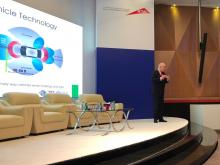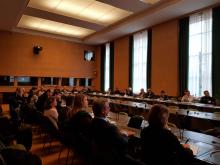
The two-day 2018
And with RA playing a key role in helping inform the agenda for the roll-out of automated vehicles in Australia - and
“We are keen to learn from other jurisdictions as to how they are preparing for driverless vehicles, and at the same time share what we are doing here in Australia,” he said.
“The enormity of the change that is coming behoves us all to work together to ensure the transition is as seamless as possible, and delivers the most good for the global community.”
Last year Roads Australia led a delegation of Australian public and private sector leaders on a fact-finding visit to the US and Europe to look at how governments were preparing for the roll-out of CAVs.
The findings, which were compiled into a detailed report that is now helping inform the debate in Australia, include:
- all new vehicles to be fully driverless within 10 years
- private vehicle ownership on the way out, with ride sharing set to evolve into driverless fleets
- road user charging must anticipate the transition, with the focus on how we charge the ‘new’ rather than the ‘old’
Since the release of that report, RA has been working with its key stakeholders in government and industry to further define the immediate challenge for policymakers, which includes educating the public to the existing inequities around road funding and what individuals pay to use roads (Australia essentially relies on a mix of state vehicle registration charges and an outdated Federal fuel tax system); tackling the issue of big data and cyber security; developing a concept of what new automated road networks will look like in the future; and following on from that, a decision-making framework on how and where we invest to adapt our existing networks to get it ready for the task ahead.
“All of these issues will resonate with governments and road network owners and operators around the world,” Webb said.
At the RA – IRF Regional Conference in Sydney, a number of international speakers will bring their own particular take to some of these questions. These figures will include International Road Union president, Christian Labrot, who will talk about the impact of vehicle automation on freight and logistics, and Contra Costa Transportation Authority (CCTA) executive director, Randy Iwasaki.
Contra Costa County, situated on the doorstep of Silicon Valley in central California, is home to the largest autonomous vehicle testing facility in the US, managed by CCTA. Among other issues that will be on the agenda at the Sydney conference in May/June are:
- the impact of new technologies and materials
- the evolving roles of government and the private sector in building, owning and running roads and transport
- the changing shape of cities and how it will affect infrastructure planning and delivery
- the renewed focus on customer-driven transport planning and solutions, and
- the ongoing challenge around road safety
The RA – IRF Conference will also have a focussed session that looks at three of the largest transport infrastructure projects currently underway in Australia, and what lessons can be taken from them in terms of public procurement, community engagement and integrated planning. “Australia is currently experiencing a boom in infrastructure planning and spending, particularly along the Eastern seaboard, and this Conference creates a great opportunity to tap into the experience of those who are delivering some of the largest transport infrastructure projects in the nation’s history,” Webb said.
“We’re very excited to invite the world to Sydney for this landmark conference.”
- Roads Australia and IRF Geneva members can register at the member early-bird rate up until April 13th. For online registration or more information on the program, visit www.roads.org.au









